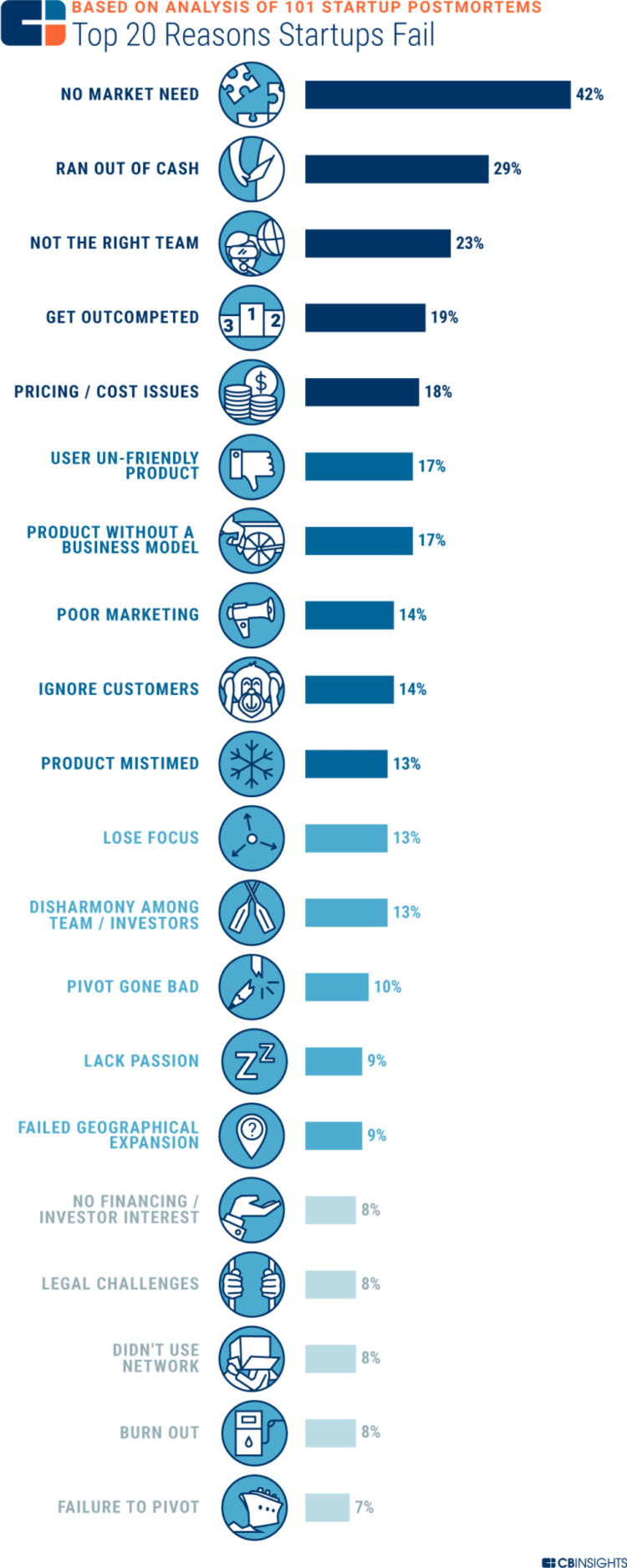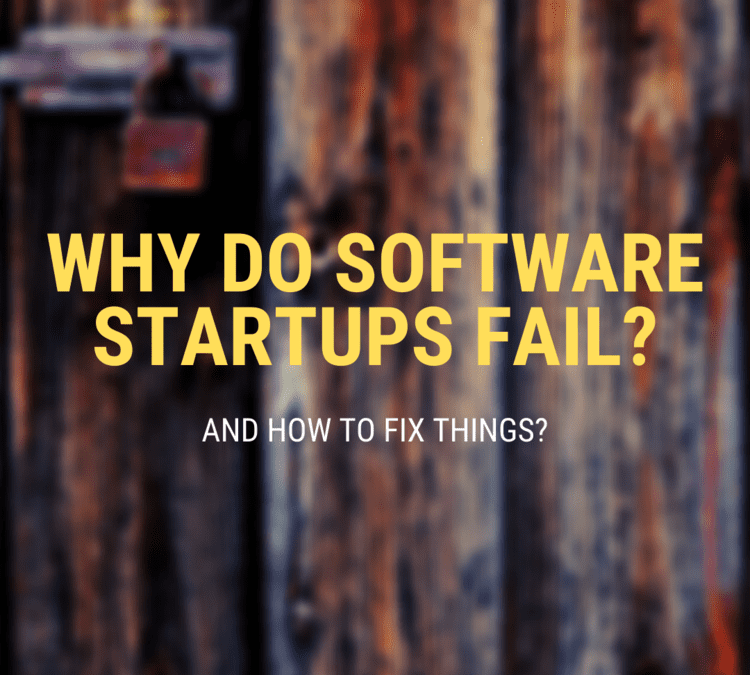
Top software for business in 2023
December 12, 2022
Living with bugs in released software products
December 12, 2022Did you know that most software startups fail?
et majority of the startups that fail actually have great business ideas. Take the failed startup Kettlebell Kitchen for example (shut down Nov 2019 after 11 years of trying). If you think about their idea it sounds fantastic – people want to eat well or use a particular diet -> It’s hard to maintain it yourself -> use the software to receive meal kits based on nutritionist’s advice and stay on the program. Takes on the restaurant/food business as well as the health and fitness industry in one single idea.
Yet with more than 30 Million in funding, 11 years of coding (and I’m guessing struggle) we have a company that has always lost money and is now dead. The end result is an email to its customers:

But why do software startups like Kettlebell fail?
That is a fair question. And after helping startups for the past 16 years we have some idea about what works and what doesn’t. Let me try answering that question today.
But before I do I’d like to share an amazing study done on 339 failed startups (and counting). There is so much to learn from these stories and after finding this I ask all my new startup customers to read through them. In entrepreneurship failure is the key to making it big, you fail, you learn a way of not doing something and you move to the next things slightly better at what you do. And what better way than to have a list of why and how others failed – it’s almost like a shortcut through the fail -> learn -> success route (although I think there’s no shortcut in that game 🙁 ).

OK, back to my original question about why software startups fail and also how we can address that reason. I’d like to use another great article from the same data set where the researchers have tried to go through the stories and pin down the reasons and create a graph of the reasons. I share that on the side to give ourselves a reference based on data. I list our own list of reasons from our experience below, some of which map pretty well with the graphic and some don’t that much. But it’ll give you food for thought.
Forgetting the main goal of a software
Every successful software platform solves a particular pain point. Even Facebook solves a problem (creates others on the way though 🙂 ) of staying in touch with people busy in their daily life. The success of the startup depends on how well the pain point is solved. Many startup founders lose their way during the build out process of a startup and start trying to solve too many things at once or sometimes imaginary pain points that has no use. Having a clear goal about the pain point that the software will solve is essential for startup success. This maps very much to the #1 item in the list above “no market need” – since not solving the pain point leads to exactly that.
Spending too much too early
No one has the crystal ball to tell the future and no startup founder knows what will work and what will not. You have to start with a hunch or a niche and then figure out how much of your initial idea actually was useful. So spending most of your budget on the initial idea, without leaving enough for the changes that need to be made for sure down the line means that the startup never gets the chance to meet the need in the market and dies. Again this maps well with the #2 in the data – “ran out cash”.
Obviously if you plan well you can make your money go a long way and get more out of it and thus get more done all the way through. Being smart with money is the most essential skill in startup leadership. KettleKitchen in my example above died after burning through 30 million in investment and millions in revenue it was earning itself. The fact that it survived for 11 years mean it had something going for it, lack of money management is what killed it.
No wonder a lot of smart startups use software teams like ours to keep their cost in control. They can dial up or dial down the cost as needed as they try things out in the market place. And using a company like ours which offers great rates because of the fact that we are in a low cost country makes a big difference. One of our all time best service product is the “Launch under 10K” we offer to startups.
Getting a software team that’s not a good fit
This is a big one. At the end of the day, whatever idea you have, however much focused you are about your goals if you don’t have a great software team that fits with your work culture and your way of doing things your startup will always fail. So if you are hiring, spend a lot of energy in the hiring process, since you’ll be stuck with this team forever and you make and break based on this team. If you are getting an outside company like us to make the software for your, spend time to find out if the outside team is a good fit for you and your product (and not just the price they are offering). Check out our great little post about this topic: How to select a software vendor?
This is #3 in the list based out of the stories above.
Not having a price for everyone
Every restaurant you go to you’ll see that they have a range of prices. Why? Because they don’t want to turn customers away just because it’s too pricey (or too cheap!). Same for software products, not having a range of options to fit different software budgets is a common mistake. Remember you can always upsell but getting the user to try your product and get to know it is a big deal for an unknown new startup. So have a range of packages, and always, always have a way that the user can try it for free – maybe a free 14 day trial, maybe a free basic edition. That’s essential to remove the barrier of “I don’t want to spend without know if this is what I need”.
Waiting too long to get the “perfect” first product
This is the other big one, especially for first time entrepreneurs. They just won’t release something that’s not perfect. Perfection here is what they have in their mind – an unattainable beast formed out of a hundred other software that the founder has seen, a mixture of Steve Jobs and Bill Gates videos about how software should be and sometime even a book on design. Waiting too long to release your product is sure way for death in this fast paced, fickle reality of the Internet, short attention span and crowded app producers. You just can’t wait, and not only because you want to get things out before your competitors do (or before your marketing message is lost) but also because you need to experiment and find out what you need to change, what you’ve got wrong. Release early, get feedback early, release often.
Not giving enough thought about your UX
With the wide choice out there for users sometime it takes a single bad interface element to put your customers off your product. If startups focus only on the engineering or the features and think of UX as an afterthought thinking that the utility of the software is enough to make it big they are making a big mistake. No software is that important or essential anymore in this world. Sometimes you’ll find great startup success stories that just had very little features at the beginning but good user interface to attract and retain people as they put the features in gradually. I remember using Hubspot when it first came out and thinking it has nothing but look at it now as a business. User UX and that includes the onboarding makes for a successful software startup. Read our UX cheatsheet for startup founders.
Jumping in too early
“Unfortunately, the VR market never developed as quickly as we all had hoped, and we were definitely ahead of our time. As a result, Vreal is shutting down operations and our wonderful team members are moving on to other opportunities.”
— Founder, Vreal
With all the hype about the “first movers advantage” many startups feel that it’s never too early to start something new. Yet from our experience you can always start too early, it’s actually hard to be too late! When you are too early on a technology you might have spent up all your budget before you see any revenue, or adopt users or even get any media interest. Take this quote from the founder of a VR startup that failed, Vreal
It’s much harder to fail because you came in too late. Coming in late means the technology and the mass users have ready to accept your product. It’s easier to find what others have made mistakes on and get your product to be launched without those mistakes. It’s easier to market too. Sounds weird, but it’s true. This is why Facebook wasn’t the first social media mover, it’s why Lyft and others still make it with a fight with the uber elephant in this space.
OK, I’ll finish today or this will start getting boring. I’ve put in my top ones above. There are other smaller ones, but if you can fix the ones above you are on the way to success. Starting up a new software business is the most exhilarating and fun thing in the world. Do it! I wish you all the best!



